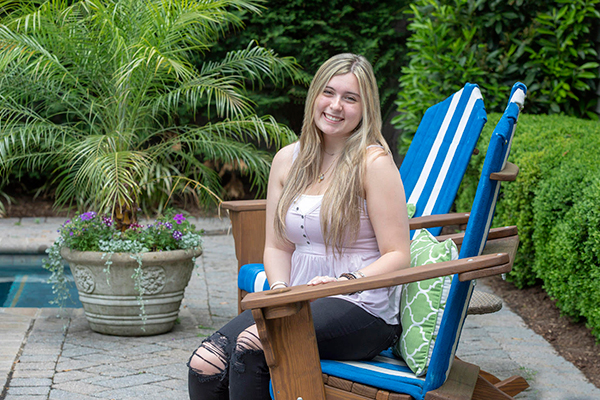
Madison Coleman wants to be a doctor. She’s not sure of the specialty yet but she definitely knows she wants to help people who are sick with diseases or conditions, like her excruciating migraines, that don’t respond to standard treatment.
“I’ve always wanted to be a doctor but after the last few years, I realized how much I want to do this,” Madison, 17, said. “It’s so hard when no one knows what’s wrong with you.”
Madison has been suffering with migraines for nearly two years, missing out on big and small events with family, friends and other students. Now, thanks to treatment by Dr. James Charles, Medical Director of the Headache Treatment Program at Holy Name Medical Center, she’s back to doing the same activities as other typical teenagers.
Before this, it was a rough road. Madison’s life had been reduced to mostly resting in dark rooms, taking tons of medications that often made her sick, and finding no relief from the excruciating migraines that had taken over her life. She was in and out of school, missed a slew of Sweet 16 parties and other social events and had to stop running cross country and playing lacrosse.
The debilitating migraines stopped her from functioning in everything but the most basic activities. Doctors are unsure why they started but a serious car accident that broke her collarbone and gave her a concussion may have triggered them. Six weeks after the collision, she started getting headaches.
As the months passed, the migraines worsened and she slowly started withdrawing from everyday activities. Her mother, Dawn, started the quest with Madison to find a doctor who could help. A plethora of tests and hours of poking and prodding found Madison had a non-cancerous tumor on her pituitary gland and thyroid disease, but not the root of migraines. They also ruled out lupus, Lyme disease, cancer, Addison’s disease, multiple sclerosis and meningitis, among other conditions.
“It’s been so hard – watching your daughter with so many symptoms besides the headaches,” Dawn said. “She’s had hearing loss, vision blurriness and at one point, her face was drooping. Madison is one of the most optimistic kids I know and to see her like that was just so difficult for our whole family.”
Things finally started to turn around when they saw Dr. Charles, who was optimistic he could help Madison. He reduced her oral medications and started her on infusions. He also prescribed SPG blocks. SPG stands for sphenopalatine ganglion, a group of nerves located behind the nose and thought to contribute to many migraines. A SPG block numbs the group of nerves and often deadens the pain.
“The people at Holy Name didn’t know Madison but from the way they treated her, it was like they’ve known her for 10 years,” Dawn said. “This was our first time at Holy Name and I was amazed at how well we were treated. Small things – like making sure I had food. They care for all of you, not just the illness. They made sure Madison didn’t feel like just a patient.”
The treatment took a few weeks to work but slowly Madison started to improve. The headaches were much less severe and soon, they were less frequent. She was starting to feel normal again. Then she got COVID-19. She felt weak, had joint pain and the migraines returned.
So they went back to Dr. Charles. More infusions and SPG blocks. She regained her strength, the pain diminished and Madison is able to focus on the future, when she’ll be attending Seton Hall with an eye toward a medical degree.
“There were days when I didn’t think I would get through it but you have to keep a positive attitude – being sad is only going to make things worse,” Madison said. “Now I know there’s always hope.”

